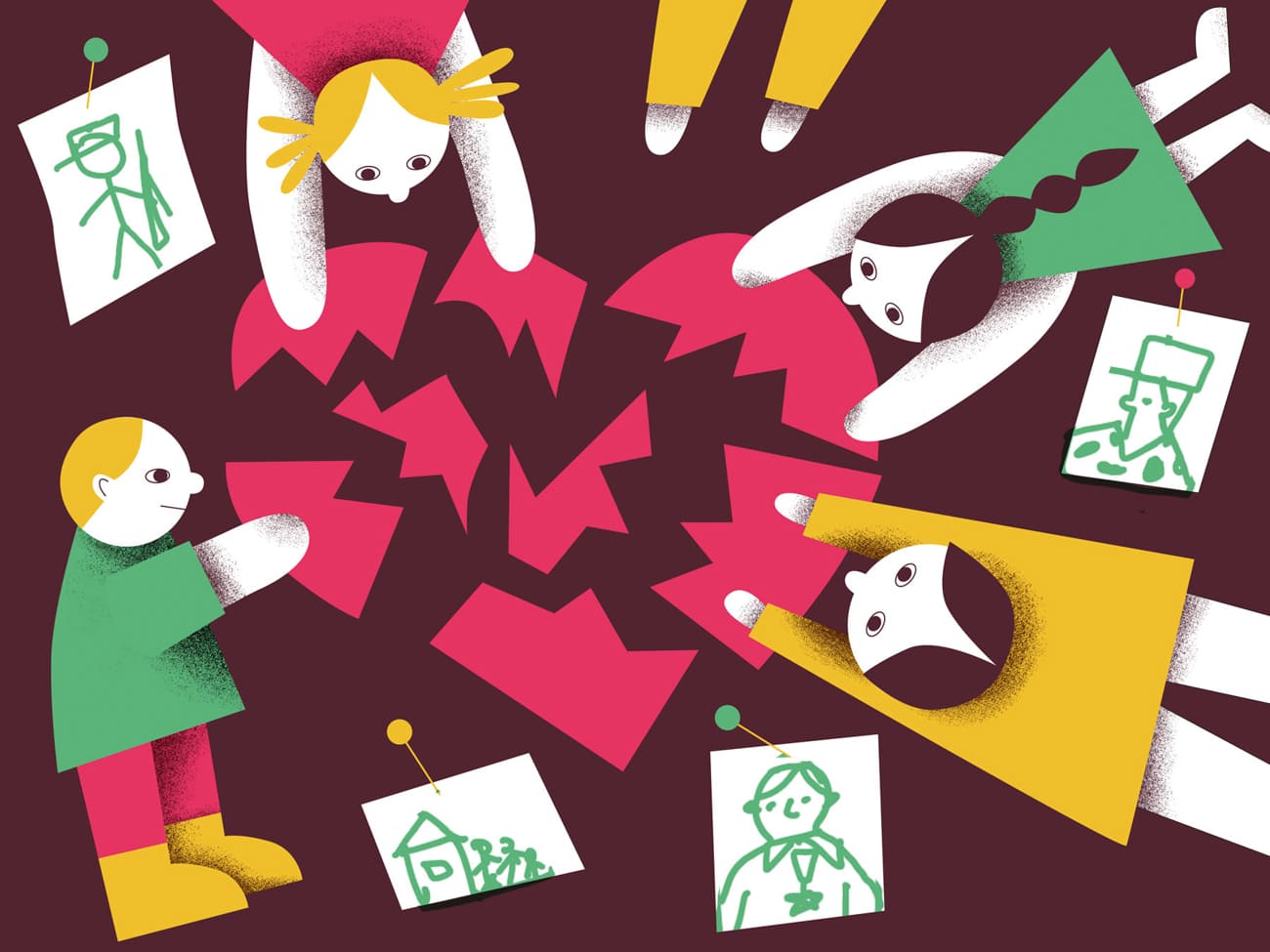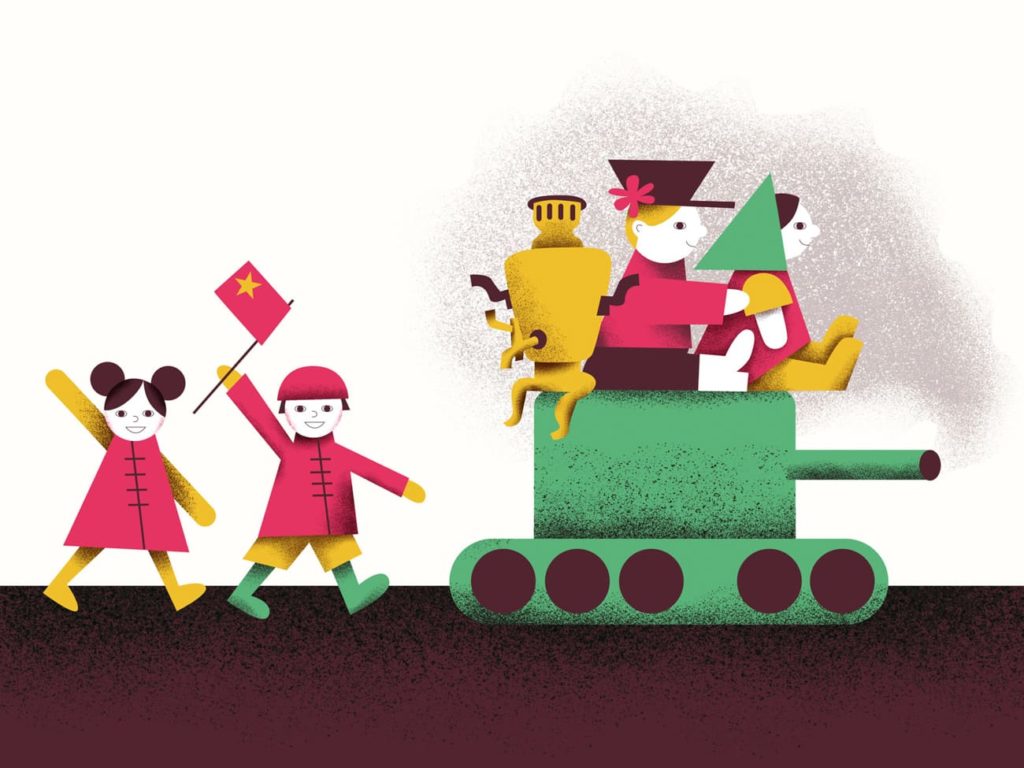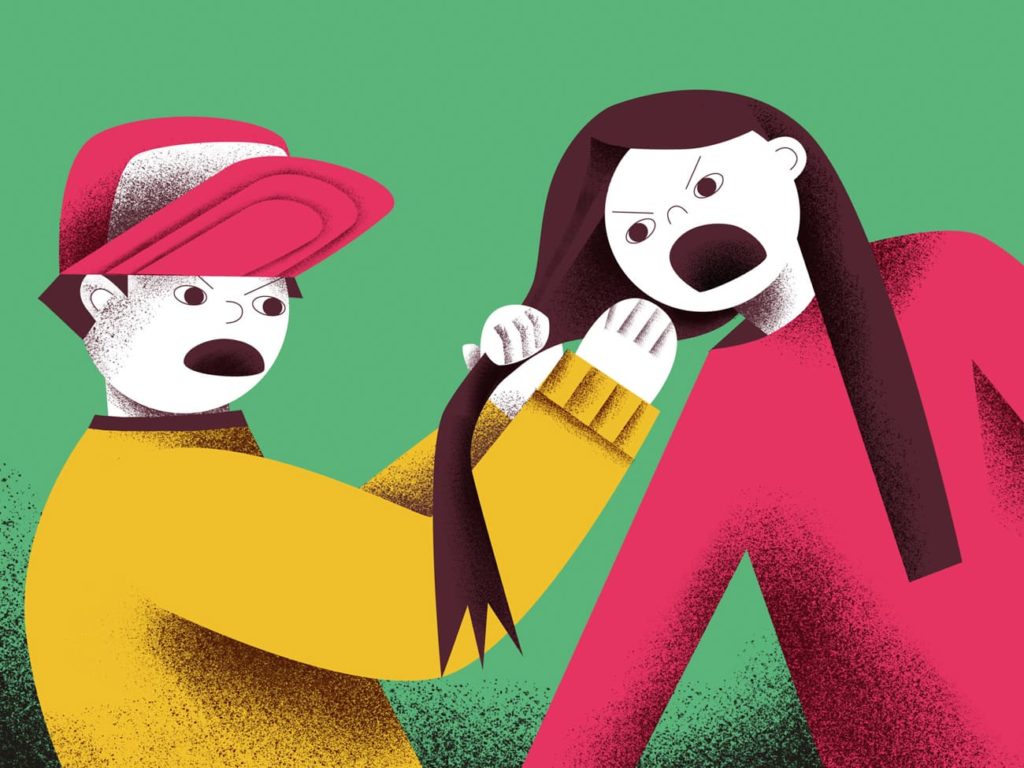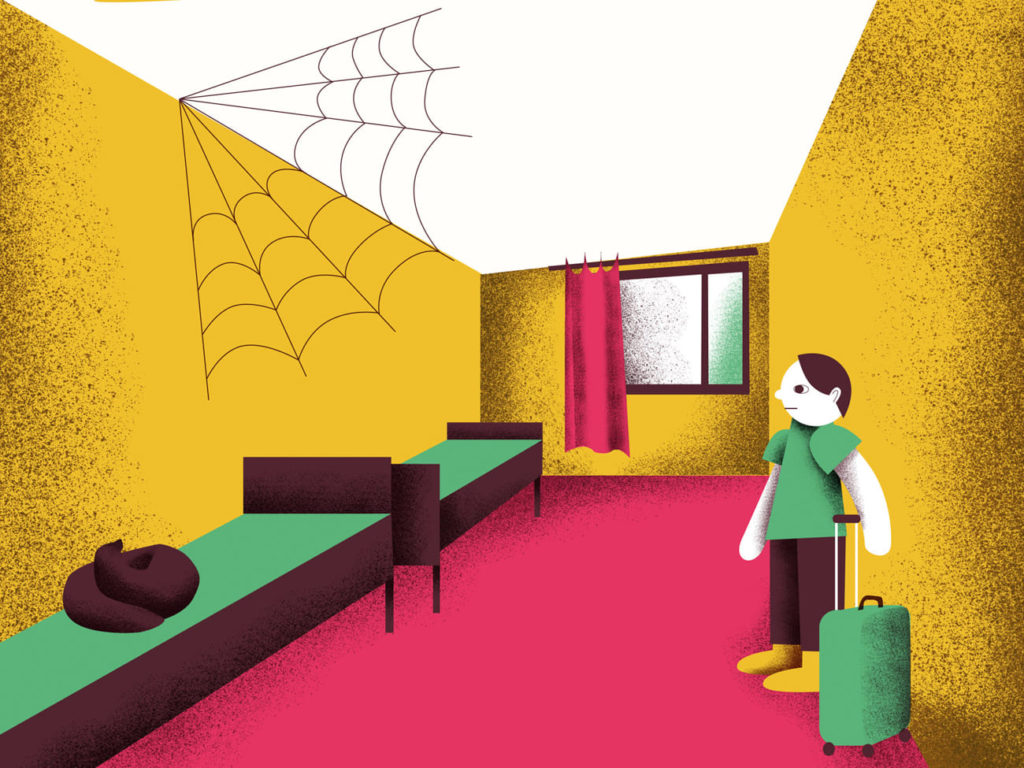
Since the Russian invasion of Ukraine in 2022, children’s summer camp vouchers have been one of the benefits that families of Russian soldiers receive from the government. Conditions vary, but even in a camp in the Moscow suburbs, with comfortable housing conditions and psychologists on call, children still missed their fathers. The New Tab reporter Lola Romanova spoke to the camp leaders and parents of the children who used their government vouchers about the patriotic camps where the war is glorified and romanticised for the youngest minds.
** Names have been changed for safety concerns.
The original piece was published in August 2024.
“No one should talk about my father”
“Mum doesn’t want to talk to me. She won’t answer the phone. Mum told me not to call her anymore”, Alina**, a camp leader recalls the words of a girl from the middle group at the Litvinovo camp in the Naro-Fominsk district of the Moscow region.
The girl’s father was at the front lines, so she rarely got to talk to him. He returned home only towards the middle of the camp session. Every day the girl fought with her mother, and when she handed the phone back to the camp leaders “she was hysterical”, recalls Maria**, Alina’s work partner.
According to the camp rules, phones were given to children twice a day: at lunchtime and before bedtime.
The children at the Litvinovo camp often talked to each other about their fathers, but sometimes even just mentioning them was painful. Maria recalls that she once heard Artur** from her middle group, who was notorious for his bad behaviour, “throwing tantrums and choking”. When Maria finally managed to calm him down, he complained that the other boys had insulted his father.
“I spoke to the boys [in the group] and they relayed the conversation with Artur almost verbatim. The guys came up to him, sat down and asked him: ‘Explain what’s wrong with your behaviour? Your parents brought you up, your mother brought you up, didn’t your father teach you how to behave?’ And the child started bawling. He said that no one should talk about his father.
According to the camp leader, Artur missed his dad very much. Maria recalls decorating the ‘group corner’ during the camp session and the children drawing their dreams. Arthur drew his father in a military uniform and wrote that he dreamed of him coming home. About a quarter of the group members drew the same thing, the camp leader recalls.
The government is paying to send children of Russian soldiers fighting in Ukraine to those summer camps. According to the Ministry of Social Development of the Moscow region, in the summer of 2024, families of servicemen received about three thousand vouchers for the camps. This corresponds to the number of places over six summer sessions (each session counts 500 spots). The camp leaders confirmed that most of the camp members were children of soldiers fighting in Ukraine.
The New Tab has not been able to find out the exact number of children from soldiers’ families who have come to Litvinovo. The camp director, Evgeny Chernikov, refused to talk to us without the permission of the Ministry of Social Development. The ministry did not give its permission because of “parents of children in the camp hadn’t given their consent for videos and photos of their children in the media”. It is unclear what filming of children had to do with the interview: The New Tab never planned to do any filming. However, in June 2024, the 360 TV channel published a video report from the camp.
“Litvinovo” welcomes children aged 7 to 15. This camp is a branch of a centre for social services and eehabilitation, managed by the Ministry of Social Development of the Moscow region. In June, Andrei Vorobyov, the Governor of the Moscow Region, visited the camp, and in July, Anna Tsivilyova, Deputy Minister of Defence and a great-niece of the President of the Russian Federation, paid a visit too.
The living conditions in the camp are more than decent. Inaugurated in 1955, it was completely rebuilt over the past 20 years, and by 2024 several new buildings, equipped with golf courts, bowling alleys, a rollerdrome, darts and billiard rooms and two indoor swimming pools had been built. In 2023, Litvinovo ranked among the top ten best summer camps in the country.
Patriotism and the list of forbidden things
Every day at Litvinovo started with the hoisting of the national flag and a collective listen of the Russian anthem. Maria says that in six years of working in children’s camps, it was the first time that camp leaders were advised to not just listen to the anthem, but to also sing along.
Every morning, children went to their workshops: moulding clay figures, drawing, making soap and studying Chinese art.
“Since Russia has very good relations with China, we decided to introduce a class where they talk about the country, its traditions, and national art. Children also made handicrafts,” said Kristina**, one of the Litvinovo camp leaders.
In July, the camp organised a fair of Old Russian art, where children participated in traditional Russian group dances alongside hosts dressed in folk costumes.
On July 12th, the whole camp celebrated the Day of the Apostles Peter and Paul, or the Day of the Kosovorotka [a traditional Russian shirt – Editor’s note]. Children played games against the background of inflatable figures of samovar and matryoshka dolls. At the festive concert everyone wore dresses the colours of the Russian flag, and artists from the Naro-Fominsk Central Palace of Culture performed ‘folk songs’, including the famous ‘Mother’ by Tatiana Kurtukova.
Children from China also spent part of their holidays in Litvinovo this summer. They came with their mothers, but lived in groups with Russian children and attended camp events together. At the end of the session, the children wrote letters to each other in the future, and the mothers of the visiting children read out a short speech in Chinese (a translator was present). Kristina recalls one particular moment from this speech: “One woman said: ‘The world needs peace, countries should be friends. Come to China, we are waiting for you.”’
Children from the tent camp organised on Litvinovo premises in early August were taken to a tour of Moscow’s Patriot Park, where they were told about the Great Patriotic War and introduced to modern military equipment of the Russian Armed Forces.
The camp itself had a tankodrome: a designated track, where children could ride a mini version of the T-34 tank, According to Kristina, “they loved it”.

In August, a Russian military blockbuster “T-34” was screened at one of the movie nights, and the serviceman Rustam Sayfullin, who in 2022 received the title of Hero of Russia for his participation in the war with Ukraine, also came. He shared his life story with the children, and they told him about their brothers and fathers.
The topic of war was also present at other events in the camp, such as the group song contest. During the sixth, August session, the children sang World War Two songs.
“Children’s brains can’t absorb the fact that a loved one is doing the wrong thing”, says Yekaterina**, a psychologist who works with the project “Without Prejudice”. If military-patriotic themes are presented to them in a romanticised way, it can affect the way they perceive war, she adds.
“You can call it whatever you want: that they [children] are victims of propaganda or whatever. But many of them genuinely believe their parents are doing the right thing”, says Yekaterina.
At a meeting before the opening of the 2024 summer season, the Litvinovo camp leaders were instructed on what music to pick for children: songs by foreign artists and “foreign agents” are banned. In order for everyone to be able to navigate these requirements, the camp’s sound engineer posted the list of banned artists in the camp leaders’ group chat, Maria says. Most of the names on the list are Russian and Ukrainian musicians, artists, poets, writers, and actors who have spoken out against the war. Many of them left Russia after 24th of February 2022. For some reason, Ukrainian paediatrician Yevgeny Komarovsky was on the ‘banned artists’ list.
Litvinovo is not the only children’s camp with a list like that. In May, a memo was posted in an open Telegram group chat, where camp leaders from different camps share their tips for organising children’s freetime. A list called “Artists recognised as foreign agents in Russia” counted 30 bands and artists, including whose who don’t have the official status, like Yuri Shevchuk and Valery Meladze.
Some Ukrainian performers’ songs were allowed to be played at the camp discos though. “[The lead singer of the band ‘Poshlaya Molly’] Kirill Bledny, though Ukrainian, has openly supported the annexation of Luhansk and Donetsk republics, so he is allowed”, Maria explains. Two songs in particular, she says, make people emotional: “I am Russian” by Shaman and “Mother” by Tatyana Kurtukova. As a rule, they were played at the end of the disco, and the children jumped and sung along at the top of their lungs.
Kirill Bledny left Russia after February 2022 and participated in concerts organised by the Save Ukraine charity. In 2023, he called the Polish language “fucked up” and suggested that Polish citizens “speak a normal language”, Russian, and return to the Russian Empire. After a while, the musician apologised for his remarks, called the video “a parody of the imperial Russian” and reminded that he was born in Ukraine.
However, as Alina, a camp leader, recalls, not all children were so enthusiastic. Some had to be escorted out of the concert hall after having panic attacks: “They started choking, they were shaking. We called psychologists, but sometimes they were busy and we [camp leaders] had to calm the children down ourselves. Some said they were just scared of the loud sounds, others said that such patriotic songs reminded them of their fathers, and made them miss them”, she explains.
“At least my father is alive”
“There were several girls in my group who weren’t from military families, says Alina. One of them was very calm, quiet, and at the end of the session I found out that she actually hadn’t felt very comfortable throughout the session. She didn’t understand why many children [from military families] were trying so hard to draw attention to themselves”.
Making sure every child got enough attention, the camp leader admits, was difficult. Although the official sanitary rules require each group to have a maximum of 30 children, she had an average of 50 kids in each group.
“My parents don’t give me attention, and I don’t get it here either. The only way to get it is to misbehave”, a child once confessed to Alina. The boy, whose dad worked in the military, came to her in tears. He was an “uncontrollable hurricane”, she said, and every day she had to take him to his bed personally and talk him to sleep.
“They need more love than normal children. At home, they have a more difficult situation than others, and they need to be given the affection they have been deprived of”, Kristina recalls the instructions the camp leaders received from their supervisors during the summer internship at the Moscow Pedagogical State University. The university collaborates with Litvinovo and sends its students to the camp for summer internships.
Natalia Ryltseva, the mother of one of the girls who received a voucher to Litvinovo as a child of a military officer, appreciated the camp’s varied program. Her daughter, she says, was particularly impressed by the visit of the head of the Moscow region, Andrei Vorobyov: “They got T-shirts, free ice cream and strawberries. She called me, all happy and said: “The governor came to see me!”.

The children talked a lot with Vorobyov and told him about their worries, says Maria, one of the camp leaders. One of the boys complained that his grandmother lives in poverty and cried. Another child asked the governor to bring his father home. Andrei Vorobyov replied that it was impossible, but concluded encouragingly: “Let’s see what we can do”.
Not all children have the luxury of dreaming of their fathers returning home: some of them died in the war.
“I had a very shy boy in my group. After a while he told me that a year ago his father had died at the frontline. When the family found out, his mother and sister cried, but he went into another room and didn’t cry at all, says Maria. He had a “thing” with a girl in the camp, and she was very worried because she couldn’t get any attention from him. He just wouldn’t talk to her, he was very cold”.
Sometimes, children would find out about their fathers’ injuries during the camp sessions. Kristina describes the reaction of one of the boys: “He came over and said, very composed, that his daddy had been bombed, he got hit in the head <…> Of course, we gave him special treatment at the time. His mum came to pick him up and took him to see his father in hospital. Then the boy came back”.
Psychological research on children’s behaviour in war or when faced with the consequences of war shows that the loss of one or both parents can cause children to develop PTSD symptoms (post-traumatic stress disorder).
Psychologist Yekaterina explains that children of war veterans share a sense of anxiety for their loved ones and with a proper psychological approach this sense of belonging to a group can help them: “If you bring them together to show that they are not alone, it’s an equivalent of support groups”.
They were several attempts to organise a support group in the camp: nine psychologists worked during each session, one per two groups. They conducted trainings and received lists of “children at risk” from the camp leaders:
“Those who refuse to eat in the first few days, those who still want to go home after a week of adaptation and those who behave aggressively,” Maria explains.
According to the camp leaders, psychologists helped them in their work with children, but it was not enough. And sometimes children’s traumas became reasons for bullying.
“I had a girl whose father died a month before her shift. And sometimes [other children] would remind her of what happened to her and say something along the lines of “At least my father is alive,’’ Alina says.
“Whoever dares to hurt you, punch them in the face”
In mid-June, children arrived at the camp for the new patriotic shift called “Remember!”. Among them was 12-year-old Lena**. She was wearing “baggy clothes and a baseball cap which covered her hair completely”, recalls Maria, one of the camp leaders.
The group soon gave Lena two nicknames: “hybrid” and “dude”. According to Maria, the camp leaders immediately told the camp administration about the bullying and asked psychologists to speak with the children, but it didn’t help. Lena had a fight with her bully Natasha** (both girls’ fathers are war veterans). Psychologists started to work with the girls individually again.
“We were asked to pay attention to what children discuss with their parents on the phone, recalls Maria. Lena first called her father and told him that she was being bullied. Since she was on speakerphone, I heard her father say to her in an aggressive and commanding tone: ‘Okay, take your things and leave. Even if you have to climb over the fence, just go.’ Then she called her mum, and she said in the same aggressive tone something like, ‘Whoever dares to hurt you, punch them in the face”’
A few days later, the children gathered for an event in the camp’s assembly hall. As usual, Lena came wearing her baseball cap. The girl put it on the chair and when she stood up, the cap fell through the hole between the backrest and the seat. When Lena couldn’t find it, she thought Natasha, who was sitting behind her, had taken it.
“Lena turned around, yelled ‘You bitch!’ and walked in-between the rows towards Natasha. When she got there, she swung her arm over her and I had to ‘block the blow’, says Maria. I convinced Lena not to start a fight, she ran out of the hall and headed towards the gates. I already thought that she decided to follow her father’s advice and run away, but she started beating the bushes, throwing her cap on the ground, yelling”.
The psychologist spent all evening talking to Lena. The girl didn’t stay in the camp for long: after a few days she fell ill and was taken to the medical block, soon after her parents picked her up.

With Lena’s departure, the bullying in the group didn’t stop. Natasha started bullying another girl for being a “mama’s girl” and calling her parents whenever she got access to a phone.
Psychologist Yekaterina agrees that bullying is not a new phenomenon, but says it can also be a reaction to a stressful situation. “Children who have off the scale anxiety for their loved ones (whether they realise it or not) need somewhere to vent it. And that can happen in many different ways, including through irritability and anger”, she explains.
“All people on this big planet should always be friends”
“All people on this big planet should always be friends. Children should always laugh and live in peace”, sang children at the concert in honour of the opening of the August session in the camp facility called “Crimean Spring”.
On August 1, 150 people (children and wives of Russian soldiers fighting in Ukraine) were brought to Sudak as part of the “Crimean Vacation” programme. It was organised by the Kursk “Association of large, foster and substitute families”, which won a governor’s grant of 1.5 million rubles in 2024.
“The state distrubytes vouchers for camps in the Kursk region for children, but the number of places is limited. And many more people want a good rest. Women want to go to the seaside, but many are afraid to do it on their own, without a man” – the description of the project reads.
Still, it wasn’t possible to send all families on holiday this time. Some relatives of Russian soldiers fighting in Ukraine complained in an online forum about the “Defenders of the Fatherland” foundation, which co-organised the holidays, saying they suspect the same people participate in the trips over and over.
“It’s very important that every child here today forgets, at least for a short time, about the Special Military Operation, about the fact that their dad is there. We also try to distract the mothers”, said Tatiana Dannikova, head of the Kursk association of large families. The “Defenders of the Fatherland” Foundation in Kursk Region told The New Tab that the trip to Crimea included children of missing and dead servicemen.
The children and their mothers were taken on a tour, they participated in a robotics and drawing workshops. The session ended on 11th of August. On August 6th, fighting started in Kursk region. The “Defenders of the Fatherland” Foundation refused to tell our reporter where the children and their parents were taken after to the end of the session.





